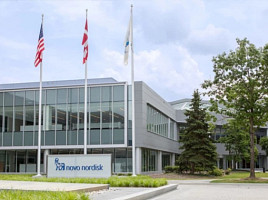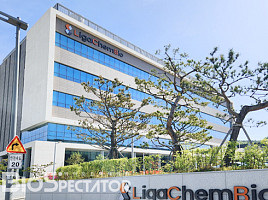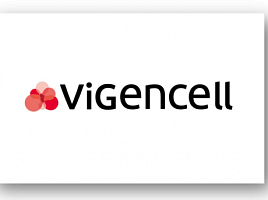기사본문
ABL Bio has entered the PD-L1x4-1BB BsAb competition with promising Phase 1 interim results
입력 2023-09-05 17:59 수정 2023-09-05 18:00
by Sungmin Kim

ABL Bio announced in September 5th that it confirmed one case of complete response (CR) and three cases of partial response (PR) in the interim results of phase 1 clinical trial for the solid tumor of PD-L1x4-1BB bispecific antibody ‘ABL503’. Compared to leading competing candidates, the difference is that a CR response was observed in solid cancer patients with only the single administration of ABL503.
ABL503 is a project being jointly developed with Nasdaq-listed company I-Mab, and the interim results of the phase 1 clinical trial of CLDN18.2x4-1BB 'ABL111', developed by the two companies, will be announced at the European Society of Medical Oncology (ESMO 2023) next month. As clinical development progresses, the anti-tumor activity of the leading 4-1BB bispecific antibody candidates is being confirmed.
The CR case disclosed this time was confirmed in a patient with ovarian cancer, which is known to be a type of carcinoma that does not usually respond to PD-(L)1 immune checkpoint inhibitors. Additionally, three cases of PR were observed in patients with melanoma, gastric cancer and head and neck cancer, respectively. So far, when ABL503 was administered to 9 people in the dose escalation part based on the efficacious dose, there were 3 drug responds (2 PR + 1 CR), and 4 cases (3 PR + 1 CR) in a total of 14 people including some part of the dose expansion has been reported.
The drug response was observed above a certain dose and the positive aspect is that the effective dose of ABL503 is set at a higher dose than that of its competitor, Genmab. ABL Bio is further increasing the dosage based on safety data. It is known that the dose of 4-1BB checkpoint inhibitors that can be administered clinically is limited due to liver toxicity observed when administered systemically, and ABL Bio has developed a mechanism to specifically activate 4-1BB in the tumor microenvironment through bispecific antibody platform design. This indicates that the proof-of-concept (PoC) results of this strategy are being observed.
ABL Bio is currently conducting dose escalation and dose expansion of ABL503 in phase 1 clinical trials in the U.S. and South Korea. The recommended dose for phase 2 (RP2D) and the optimal indication are planned to be selected based on the safety of monotherapy and initial anti-tumor activity data.
The final results of the dose escalation part of the ABL503 in phase 1 clinical trial are scheduled to be revealed at an academic conference early next year.
Although direct comparison is difficult, 4 PRs and no CRs were observed in the phase 1 clinical trial of Genmab's PD-L1x4-1BB bispecific antibody ‘GEN1046’ in 61 patients with solid tumors, which is a leading competitor candidate. PRs are observed for triple-negative breast cancer (TNBC, 100 mg) and ovarian cancer (80 mg) patients without prior PD-(L)1 treatment and non-small cell lung cancer (NSCLC, 80 mg/200 mg) refractory patient with prior PD-(L)1 treatment. The disease control rate was 65.6% (40/61 people). Genmab is conducting phase 2 clinical trials of GEN1046 based on these results.
Additionally, in the case of GEN1046, the administration dose was limited to 100 mg in the dose expansion part of the phase 1/2 clinical trial. ABL Bio explained, “ABL503 did not show toxicity even when administered several times higher than 100 mg” and added, “It is believed to have secured superior safety compared to competitors and is also advantageous in selecting the optimal dosage (RP2D) for high efficacy.”
In addition, another competitor, Inhibrx, is conducting phase 1 clinical trials of the PD-L1x4-1BB bispecific antibody ‘INBRX-105’.
ABL Bio is also predicting the possibility of combination therapy with existing oncology drugs based on the safety and anti-tumor activity of ABL503 monotherapy. The company anticipates that this will have a positive impact on fostering potential partnerships and advancing late-stage clinical development of combination therapy in the future.
Dr. Sanghoon Lee, CEO of ABL Bio, remarked, “ABL Bio is dedicating substantial efforts to expand its oncology pipeline, moving beyond neuro-degenerative diseases, with a focus on 4-1BB-based bispecific antibodies. Given the fierce competition in the oncology drug market, our priority is to swiftly secure clinical results, and we are already seeing promising progress in our 4-1BB bispecific antibody trials.”
He further emphasized, “Our pipeline is clearly demonstrating clinical differentiation when compared to existing competitive drugs, and as a result, the value of our pipeline will continue to be highlighted.”
ABL503 is a bispecific antibody immunotherapy that simultaneously targets PD-L1 and 4-1BB and is based on ABL Bio’s tumor microenvironment-specific 4-1BB bispecific antibody platform ‘Grabody-T’ technology. It is expected to overcome the drug refractoriness of the PD-1 immunotherapy 'Keytruda' through 4-1BB-mediated T cell activation and solve the recurrence problem seen with CD3 bispecific antibodies or antibody-drug conjugates (ADC) through long-term memory formation.
관련기사
- ‘Turning point’ of ABL, T cell engager is “the reason to be confident”
- The 4 meanings of the ABL-Sanofi’s $10.6B deal, Comparing with big deals in K...
- Sanofi pays ABL Bio $75M to jump into α-synuclein race, betting on best-in-cl...
- ABL Bio, unveil 'BBB shuttle antibody targeting α-Syn' preclinical data at AD...
- ABL Bio Enters into L/O agreement with TRIGR Therapeutics for ABL001







